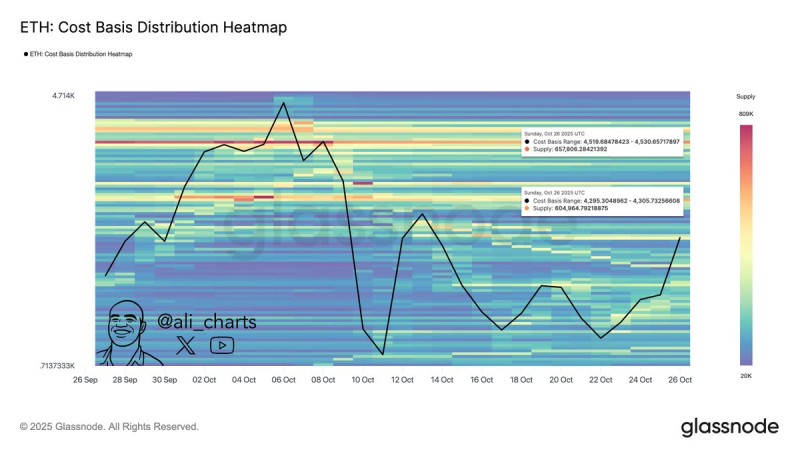Ethereum (ETH) is testing two important resistance zones that could decide where it heads next. Large groups of ETH investors have their entry points clustered near $4,300 and $4,530, which means we could see significant selling pressure if prices reach these levels again.
On-Chain Data Highlights Critical Resistance
According to on-chain analyst Ali, the Glassnode Cost Basis Distribution Heatmap shows dense accumulation zones between $4,295–$4,305 and $4,519–$4,530. These are price ranges where hundreds of thousands of ETH were previously purchased. As of October 26, 2025, roughly 657,806 ETH were acquired in the upper range ($4,519–$4,530), while 604,964 ETH were bought near $4,300.

What this means in practice is simple: investors who bought at these levels may look to sell when ETH returns there, either to lock in gains or break even on earlier losses. The heatmap's orange-red coloring at these price points confirms heavy supply concentration, suggesting Ethereum could struggle to push through before building more momentum.
Market Context and Technical Implications
Ethereum's recent recovery has shown decent momentum, but the chart indicates potential cooling near these resistance zones. When cost-basis clusters form at similar price levels, markets typically consolidate or pull back before gathering enough buying strength to move higher. If ETH manages to break cleanly above $4,530, it would signal strong demand and could open the path toward $4,800–$5,000. On the flip side, rejection at these levels might trigger a short-term pullback toward $4,000 as traders take profits.
Broader Perspective
The assessment of Ethereum's on-chain structure aligns with current market sentiment—confidence is returning, but significant resistance remains. The strength of these clusters shows that market participants are highly focused on the $4,300–$4,530 corridor, making it a decisive range for Ethereum's near-term direction. External factors like liquidity inflows, macroeconomic conditions, and Bitcoin's trend will also play a role in whether ETH can push through these barriers or remain range-bound.
 Hillary Uzomba
Hillary Uzomba

 Hillary Uzomba
Hillary Uzomba


